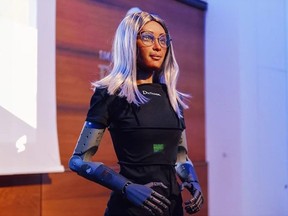
Article content
As 2023 is about to get her curtain call, it’s always of interest to reflect on how the year unfolded.
Advertisement 2
Article content
Many saw changes to their careers; many businesses experimented with new labour approaches.
Article content
Without a doubt, the most dominating trend in employment this year was artificial intelligence. A.I. didn’t exactly introduce itself to the workplace, it barreled through most businesses like a bull in a china shop.
So what were the most noteworthy employment stories in A.I. this year?
ChatGPT is not your lawyer: Early this year, I covered the alarming trend of employers using ChatGPT to draft employment contracts. I created a ChatGPT account for the article and immediately was warned it “may occasionally generate incorrect information” and has “limited knowledge of world and events after 2021.” It also told me that any information I input into the program wasn’t confidential.
Article content
Advertisement 3
Article content
When I asked ChatGPT to draft an employment contract for me, it got some significant components wrong, including entitlements on termination. In the seven months that have elapsed since I first wrote about the topic, ChatGPT has not improved enough to change my mind – ChatGPT, still, is not your lawyer.
Recommended from Editorial
-

CHAUDHRI: Short service employees achieving staggering results in court
-

CHAUDHRI: Aggressive litigation tactics fail employer in court
-

CHAUDHRI: Ontario Court of Appeal upholds massive award of 27 months pay on termination
AI based terminations: In July, I told you the story of the founder of an Indian A.I. company, Dukaan, who announced on Twitter, “We had to layoff 90% of our support team because of this A.I. chatbot.” The founder even confirmed that having a chatbot respond to customer queries drastically reduced his company’s support costs by 85%.
Advertisement 4
Article content
Dukaan is just one of the countless companies aiming to use A.I. to reduce employee headcount imminently.
In fact, Goldman Sachs released a recent study that forecasts 300 million jobs will be displaced by A.I.. That’s just shy of the entire U.S. population. A.I. terminations this year will lead to higher liability for employers, and reduced retention for remaining employees.
Most employees are not transparent about using ChatGPT at work: Last summer, I recounted the story of a lawyer who was discovered by a Federal District Court in New York to have filed a legal brief generated by ChatGPT. Upon the court discovering the fictitious brief, it considered laying sanctions on the offending lawyers that filed it. Any lawyer or employee who uses A.I. to create a shortcut to perform their work is playing a dangerous game. If employees use ChatGPT to complete significant work-related tasks, they are begging employers to invest in A.I. and not employees.
Advertisement 5
Article content
RECOMMENDED VIDEO
A.I. in leadership: Last month, the world was introduced to Mika, the female robot appointed “AI CEO” of the Polish beverage company Dictador. In a Reuters interview, Mika said, “I don’t really have weekends. I’m always on 24/7.” While Mika’s introduction is likely an attempt to grab global headlines, the move signals institutional coziness with artificial intelligence leadership.
The introduction of A.I. to the upper ranks poses considerations, including the inherent bias in A.I. systems, it discourages implementing true diversity goals to organizations and leaves current employees wondering about their own career trajectories.
If 2023 is any indication, 2024 will be rung in with more stories of A.I. creeping into the workplace – only sometimes being welcomed through the front door. Employers and HR professionals have every reason to prepare now and implement A.I. governance policies to govern employees use of this all-pervasive technology.
Have a workplace question? Maybe I can help! Email me at [email protected] and your question may be featured in a future column.
The content of this article is general information only and is not legal advice.
Article content
link

